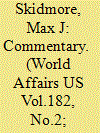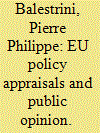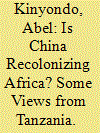|
|
|
Sort Order |
|
|
|
Items / Page
|
|
|
|
|
|
|
| Srl | Item |
| 1 |
ID:
168062


|
|
|
|
|
| Summary/Abstract |
This article directly and bluntly challenges traditional thought by casting aside conventional wisdom regarding the national economy, replacing it with Modern Political Economy and Public Policy. American national policies, I argue, should always, whenever possible, be universal, not targeted toward specific groups. Moreover, policies need to be crafted to achieve their goals, not to fit within budgetary constraints. The least government is the worst, not the best, and a miserly approach to spending is not “wise use of the taxpayers’ dollars.” The national government controls the currency, paying its bills in dollars. It issues dollars as needed, in whatever amount it chooses, and is unrestrained by the need to “find the money” or “pay-as-you-go.” Taxes are useful for purposes of regulation and control of income inequality, but are not relevant to expenditures. “Anything that is technically feasible,” I claim following Kelton and coauthors, “is financially affordable,” and there is no need to fear inflation so long as spending does not exceed the productive capacity of the economy. Despite conventional wisdom to the contrary, and regardless of the widely used jargon of politicians, when government spends, it is not using “The Taxpayers’ Money.”
|
|
|
|
|
|
|
|
|
|
|
|
|
|
|
|
| 2 |
ID:
165547


|
|
|
|
|
| Summary/Abstract |
Although the literature about European Union (EU) public opinion is quite extensive, much of it focuses on general indexes of support for the EU or one specific EU policy area. The study of citizens’ appraisal of the EU contribution across socioeconomic policies and its interdependence is uncharted territory. The present article addresses this gap in the research. Using Eurobarometer data, it is demonstrated that national publics tend to be dissatisfied with the EU contribution across policies and that this assessment is consistent and interrelated from one policy to another. Education is found to have only a relatively modest impact on this assessment while the degree of an EU member state’s integration in the world economy is not found to sway the latter. The findings finally show that national levels of unemployment, immigration, income dispersion, and the positioning of party leaderships on social redistribution influence public opinion on EU policy input. In the light of these findings, implications are drawn.
|
|
|
|
|
|
|
|
|
|
|
|
|
|
|
|
| 3 |
ID:
168060


|
|
|
|
|
| Summary/Abstract |
This study assesses Sino-African cooperation with a view to understanding its nature and subsequently identifying ways to improve it. Using a mixed method that combined in-depth interviews, Afrobarometer, and Johns Hopkins’ China Africa Research Initiative (CARI) data, I find that, despite a few gains, China takes the lion’s share of benefits from the cooperation. Indeed, the balance of trade is skewed toward China, and there is very little Chinese foreign direct investment (FDI) flowing to Africa. Moreover, ‘debt trap diplomacy’ is crippling African economies, raising alarm over whether China intends to recolonize the continent. Also, while Chinese aid is negligible, the amount of contracts revenues and diplomatic support it gets from the continent makes one think Africa deserves more from the cooperation. Nevertheless, China, just like any other country, acts in its nation’s interest. Therefore, it is incumbent upon African countries to ensure that they demand more from the cooperation. In the end, to address China’s hegemony over Sino-African cooperation, Africa should prioritize the development of local content through technological and skill transfers, curb corruption, and build a critical mass of negotiators.
|
|
|
|
|
|
|
|
|
|
|
|
|
|
|
|
| 4 |
ID:
168063


|
|
|
|
|
| Summary/Abstract |
In health care markets, moral hazard is conventionally viewed as a demand-side phenomenon in which insurance causes patients to use more care because it reduces the price they have to pay for care. However, demand-side moral hazard cannot explain why U.S. per capita health care costs are much higher than those of countries with universal coverage and lower out-of-pocket charges. Instead, blame rests with a phenomenon that may be called supply-side moral hazard, which occurs when third-party payment removes the constraints the demand curve would otherwise exert over the prices providers charge, and the quantity of expensive services they can sell. Public institutions are better positioned than private entities to address supply-side moral hazard. This helps explain why the other wealthy democracies—both those with single-payer systems, like Canada, and those with multipayer systems and all-payer procedures for setting provider rates, like Germany and Switzerland—spend much less per capita than the United States. Although managed care achieved some success in controlling U.S. provider prices in the 1990s, in the longer term, it motivated increasing market concentration among providers, which vitiated cost control. Furthermore, managed care exacerbates inequity and complexity, problems that public price regulation avoids.
|
|
|
|
|
|
|
|
|
|
|
|
|
|
|
|
| 5 |
ID:
168061


|
|
|
|
|
| Summary/Abstract |
International relations scholars have struggled to adequately link domestic and international levels in theoretical models and causal analyses of foreign policy, despite widespread acknowledgment of the need to do so. This study elaborates on this challenge by assessing the utility of several policy process frameworks that have so far been underutilized in foreign policy analysis. The assumptions of one particularly fruitful method, the Two-Level Game, will be compared with those of three policy process frameworks: the Advocacy Coalition Framework, the Multiple Streams Framework, and Punctuated Equilibrium Theory. When analyzing three specific concepts (the question of rationality, the dynamics of agenda setting, and the strategic action of relevant actors), it is apparent that the assumptions of the policy process frameworks largely clash with those of the Two-Level Game, raising the potential for their augmentation of the field of foreign policy analysis despite their relative underuse.
|
|
|
|
|
|
|
|
|
|
|
|
|
|
|
|
|
|
|
|
|